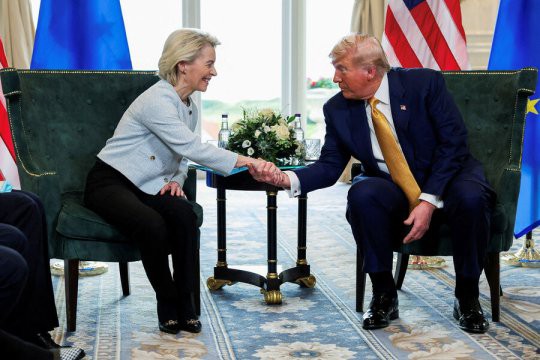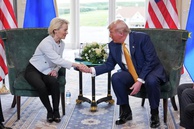The EU-US trade framework agreement reached by Donald Trump and European Commission President Ursula von der Leyen in Scotland late in July risks becoming a useless document about a bad compromise that never happened. The Europeans did not like the agreement the moment it came out and never tired of voicing their indignation at the significant and unequal tariff concessions to the Americans that Brussels was forced to make under pressure from President Trump. The European Commission and the European Council were bombarded with accusations for having caved in to Washington without using the EU's economic weight as a market of 450 million people to push back against Trump's aggressive negotiating tactics. Many politicians and business leaders had already made it clear that they would not leave it like that and would fight, since von der Leyen's signature was not the end of the story. Moreover, many started questioning Brussels’ right as a supranational body to dictate its terms to EU member states regarding energy and commerce.
The turmoil was gradually boiling over, and the first loud outburst came from the European Parliament, with its second largest faction, the Progressive Alliance of Socialists and Democrats (S&D) publicly rejecting the deal with Trump. Their leader, Iraxe Garcia Perez said the coalition was strongly opposed to this agreement, which makes EU exports subject to a comprehensive 15 percent US tariff. To fulfill its part of the deal, the EU must pass a law abolishing all duties on US industrial goods, including 10 percent duties on US-made cars, and also facilitate access to the European market for some foreign agricultural produce and seafood. The Socialists’ position seriously complicates Ursula von der Leyen's effort to form a majority needed to ratify the deal, which could plunge into chaos transatlantic trade relations, which had only started showing signs of getting better. Besides, the Socialists’ move demonstrates a looming rift with von der Leyen’s center-right allies, the European People’s Party (EPP), who support the deal and have previously worked closely with the S&D to advance key Brussels initiatives. This comes at a time when EU leaders are trying to portray the deal with Trump as an act of preserving Atlantic unity in the face of Moscow’s actions.
Meanwhile, the notorious Atlantic unity continues to crack at the seams, and Trump only added fuel to the fire with a recent threat to slap additional duties on EU countries that introduce rules and taxes, which allegedly discriminate against US tech companies. These legal acts - the Digital Services Act and the Digital Markets Act - regulate the activities of IT companies and have no analogues in the United States. The Americans do not like them, since they introduce serious control over their European operations. Therefore, here Washington demands preferences for itself. Brussels is digging its heels as Trump’s latest threat has caused a new wave of irritation among Europeans. Arguing that Trump will take advantage of any sign of weakness to escalate the trade war, Garcia Perez called for a rebuff to his bullying and for Europe to use its most powerful instrument of trade defense, the EU’s “anti-coercion mechanism,” developed in late 2023. (The mechanism has not been used so far, but the EU has designed it for use in possible future conflict situations. If the EU decides that Trump’s actions amount to “economic coercion,” Brussels will have the legal power to resort to a wide range of retaliatory measures, including trade tariffs and other restrictions and limitations on US exports, investment or government procurement.)
Garcia Perez’s comments echoed similar criticism of the US trade deal by another prominent Socialist, Teresa Ribera, executive vice-president of the European Commission. Von der Leyen’s deputy, who oversees competition policy at the Commission, told The Financial Times that the EU should be prepared to pull out of the deal if Trump followed through on his threats to regulate Europe’s tech sector. “We cannot be subject to the will of a third country,” Ribera said, adding that EU’s sovereignty was at stake and that they would clearly defend it and would not play with their values just to please someone else’s interests. She also made clear that the EU would not delay investigations into US tech giants like Elon Musk’s X. “American tech companies are making great profits out of this market, but they are subject to the same laws and regulations than any other player,” Ribera said. Another senior Socialist – the European Council President Antonio Costa, chimed in saying that he recognized the disappointment felt by many Europeans that the Union has been too passive in shaping the events of this summer in the areas of trade, relations with the US and Ukraine. During a trip to Slovenia, Costa said Washington’s attacks on the EU’s technology standards amounted to abuse of power and censorship. He stated that EU’s partners, including the US, must know that the EU will always defend its sovereignty, its citizens, its companies and its values.
In a word, Ursula von der Leyen is facing a noticeable opposition in promoting her deal with Trump. Moreover, experts say that they still don’t see the motives that prompted the head of the European Commission to abandon the official EU orientation towards the WTO, and agree to such major concessions. Many point to the role played by the Ukrainian factor, due to which she allegedly preferred not to once again test the strength of the current transatlantic alliance with Trump. Therefore, they mainly refer to Antonio Costa's speech in Bled, Slovenia, where the Portuguese made it perfectly clear that escalating tensions with a key ally over tariffs, while EU’s eastern border was under threat, would be an imprudent risk. He also prioritized stabilizing transatlantic relations and ensuring US participation in Ukraine's security.
With all that said, the EP's consideration of the Commission's proposed bill to abolish tariffs on US industrial goods, a prerequisite for reducing US tariffs on European cars to 15 percent from 27.5 percent now, would be the most immediate test of the deal with Washington. Since cars are the largest overseas export item for the EU’s largest economy, Germany, the stakes are very high here. In a statement issued in Brussels, the EC said that this would save European car manufacturers more than 500 million euros in tariffs that they would otherwise have to pay for exports in just one month. To pass, the bill needs a simple majority of MEPs to vote for it. If Ursula von der Leyen fails to convince the S&D faction to back the bill, there won't be enough "yes" votes, and her EPP party, along with its moderate coalition allies, will have to try to attract votes from the far-right European Conservatives and Reformists group and the far-right Patriots for Europe faction. Well, von der Leyen has previously forged tactical alliances with the right, but the overall mutual antagonism hasn’t gone anywhere. A majority vote for the tariff bill is only the first step though, since the European Commission will still need the consent of at least 15 of the 27 EU member states for it to come into force.
The European MPs are meeting in Strasbourg for the first time since the summer break for a plenary session that will last until September 11. Among other things, they plan to hold preliminary debates on the EU-US trade agreement and the prospects for more EU trade agreements with other countries. It is already clear that the debate will not be easy as politicians lobbying for the interests of the farming sector are particularly uncompromising. And with good reason too, because farming organizations complain that the deal with Trump effectively pushes the interests of agricultural producers into the background, while EU car manufacturers allegedly “receive a prize.” Organizations such as Copa-Cogeca and Farm Europe argue that European agriculture has not received any mutual benefit, while it still faces a 15 percent tariff cap on most exports to the US, including previously duty-free goods, above all wine and spirits. The EP will most likely demand adjustments to the agreement when it comes to agricultural exports.
Discontent among EU’s metallurgical and mechanical engineering sectors is equally growing amid America’s retention of its 50 percent duties on steel and aluminum, as well as their additional extension to a wide range of products manufactured using these metals. And now we are talking about machine tools, engines, pumps, construction equipment, etc.
According to The Wall Street Journal (WSJ), EU companies are demanding changes to the agreement with Washington since they will end up paying duties exceeding the 15 percent tariff level agreed upon by Trump and Ursula von der Leyen. The newspaper reports that in a letter to the EC’s head, the chairman of the Association of German Mechanical Engineering and Plant Manufacturers (VDMA) Bertram Kavlat warned of an “existential crisis” for the sector. According to him, about 30 percent of EU-made equipment sold to the US is now subject to 50 percent duties due to the metal content in it. As a result, some European companies are already suspending exports to the US and considering a redirection of supplies to other countries. In particular, the agricultural machinery manufacturer Krone is now considering selling to Mexico and Canada what was previously intended for the US market. As a result, the newspaper predicts gloomy prospects for the Trump-von der Leyen deal. However, a number of major players, such as Germany with its auto industry, also have something to lose if the deal, flawed as it is, falls through. Therefore, they are very much interested in supporting the EC’s head through their MPs.
The next key question is whether the US will fulfill its part of the deal. The EU is a key market for America’s services exports, above all financial, digital and entertainment platforms, where the US has a noticeable trade surplus. According to 2024 figures, the European Union accounted for 25 percent of the $275 billion US services exports. Disagreements around the aforementioned EU Digital Services Act (DSA) remain a possible field for compromise. The DSA requires companies to combat online hate speech, bullying and other illegal content.
This law prohibits manipulative techniques encouraging users to make purchases, as well as advertising aimed at children. Violations are punishable by fines of up to six percent of the company's annual global turnover. The Europeans have already targeted, among others, such US corporations as Meta (recognized as extremist in the Russian Federation, owner of Facebook) and Alphabet (owner of Google); as well as TikTok (owned by the ByteDance concern). Washington considers this EU norm an unacceptable interference in freedom of speech. However, according to The Financial Times, the United States still hopes for a compromise with the EU on the DSA issue. Will the parties really go down this path, despite the loudly declared toughness of their positions? In any case, the largest trade turnover in the world is at stake, and if the parties stick to their guns, there will be no one to dance Trump's famous "tango." Meanwhile, amid tensions in trade relations with the US and potential problems, Europeans keep looking actively for ways to expand alternative trade links and diversify their exports. On September 3, Brussels finally launched the ratification procedure for the EU’s trade agreement with the Latin American bloc Mercosur and an updated version of the trade agreement with Mexico. Both deals are expected to be presented as “EU-only agreements,” meaning they can be adopted by a qualified majority in both the EU Council and the European Parliament, without any mandatory approval by national legislatures. This is especially important in light of the position of France, which is actively opposing the agreement with Mercosur fearing that its farmers will face strong competition in the event of a sharp influx of cheap beef, poultry and other South American agricultural produce into Europe. Brussels still believes that the benefits of free trade in a market with a population of more than 280 million people outweigh all concerns. Mercosur was also discussed in August at the Franco-German summit in Toulon, where German Chancellor Friedrich Merz disagreed with Macron and called for the agreement to be ratified as soon as possible. This would give the EU some trump cards in its trade dispute with Washington.
The situation may also change now that the US Federal Court of Appeals has overturned President Trump's decision to use emergency powers granted by Congress to impose new tariffs. This immediately called into question his deal with the EU. The matter is now in the hands of the US Supreme Court.
Meanwhile as it became known the majority of Europeans – 60% – want European Commission President Ursula von der Leyen to resign, according to the results of a public opinion poll conducted by Cluster17 in France, Germany, Italy, Spain and Poland, published in the French magazine Le Grand Continent. The survey also revealed deep dissatisfaction with the EU’s trade deal with the US. Some 52% of respondents said they felt “humiliated” when they learned about the deal, while 75% said von der Leyen had failed to protect European interests.
read more in our Telegram-channel https://t.me/The_International_Affairs

 11:37 10.09.2025 •
11:37 10.09.2025 •



























